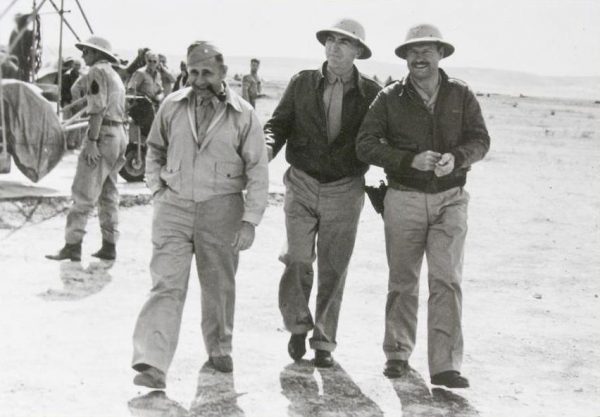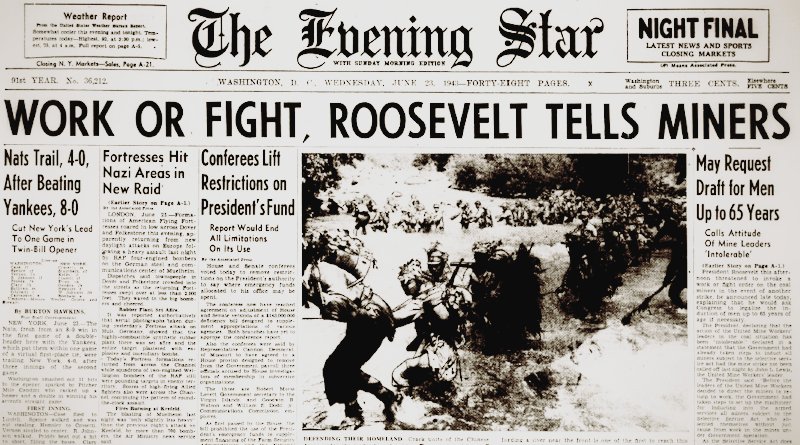World War II Chronicle: June 23, 1943
Click here for TODAY’S NEWSPAPER
A British Lancaster bomber bearing Eddie Rickenbacker landed in Moscow on Sunday (see page two). Although the trip is classified, we can safely disclose that “Rick” is on a tour of Allied nations inquiring about the performance of Lend-Lease aircraft… A fighter pilot tells what it’s like bailing out of an aircraft at extreme altitudes on page four… On the same page, Queen Elizabeth has decorated Wing Commander Guy Gibson with the Victoria Cross (King George is reportedly in Malta). Gibson led last month’s dam-busting raid into Germany’s Ruhr Valley…

George Fielding Eliot says the coal strikes and race riots are only helping the enemy and asks Americans to temporarily set aside differences and unite to defeat the Axis (page 14). It will probably take some digging to find out what is really behind the constant threat of strikes, the race riots, or the zoot-suit violence. Having been a union officer myself I know that there are good unions and bad unions, and capitalists can be just as corrupt as politicians. Was part of the threat of striking good for the country in the long run (we’d probably be shocked by the conditions miners faced in the earlier 20th Century), or was it crooked union bosses using the war as leverage and willing to break our economy to grab power for themselves? Just one out of ten Americans approve of United Mine Worker boss John Lewis, so if we are to believe polls from 80 years ago, the average American doesn’t seem very supportive. Or at least they are more in line with what Major Eliot is saying and don’t think that now is the time to fight each other…
Sports on page 20.
Roving Reporter by Ernie Pyle
SOMEWHERE IN AFRICA — Our soldiers like Leopoldville fine although they suffer from a monotony complex. For even a town of 50,000 has its limitations.
Of an evening they can go into town, have a couple of beers at a sidewalk cafe, and then go to a movie. The army runs a truck back out to camp each night after the movie.
The only prostitute in Leo was an anemic French mademoiselle who followed the world-wide custom in all lines of endeavor of upping the price about 300 per cent the moment the Americans heave into view. But the colonel in charge beat her to it by putting her place out of bounds the instant they arrived.
There ensued a long correspondence in which the Mademoiselle was first insulted, then standing on her rights, then humble, then pleading, and as it wound up she got so utterly lonesome she finally wrote and begged the colonel just to let the boys come in to sit and talk about the weather. The colonel still said no. The boys said she only weighed 85 pounds and was to ugly to talk to anyhow.
Thus died the only vestige of a Sadie Thompson story that I’ve run onto in the tropics.
We had a big Army hospital at Leo. It was built to care for hundreds, but the most it ever had was a few score patients. The staff was still hanging around when I was there, but they’ve moved long before now/
An odd thing about it was that due to the censorship of mail, and the average American’s complete lack of knowledge about Africa’s size and climate, most of the nurses families back home thought they were about 5000 miles from the war.
One Saturday night when I was there the doctors and nurses gave a big farewell party for themselves and invited me. The early part of the evening was spent signing each other’s Short Snorter bills. Then finally it came to the point where I either had to get up and dance voluntarily or else be dragged bodily out onto the floor by a few husky nurses, so I slipped out the back door and ran home.
Some of the nurses wrote their names down for me on scraps of paper. Much time has passed, and now I can’t remember what each individual looked like or anything, but here they are, and I know that by now they’re in a happier place and as busy as they want to be’
Chief Nurse Josephine Balestra, of Salinas, Cal. (we had a common bond, for Salinas is where I registered for the draft); Rachel Badger, Odgen, Utah; Gracie Blair and Mayellen Ross, both of Beaver Falls, Pa.; Sara Hale and Bertha Pollard, both of Richmond, Va.; Jane Mogarry, of Butler, Pa.; Kathleen Merran, Philadelphia, and Catherine Androulski, Washington, D.C.
The surgical and medical staff was largely from the Presbyterian Hospital in New York. Liet Col. William Casey, of Portland, Me., was in command, and he spent most of his time worrying about the prodigality of keeping surgeouns who were $30,000-a-year-men in civil life just sitting there 5000 miles from the nearest shooting, with nobody to operate on. But, as I say, they’ve moved since I was there.
On the staff were such men as Maj. Charles Flood, assistant dean at Columbia, and Capt. Robert Wylie, who they say is one of the finest chest experts in New York.
They were a grand band of Americans there at Leo, all sorts of hanging closely together in desperation against boredom and nothing-to-do and lonesomeness.
Out at the camp the few boys who are left do a little work on the roads and keep the camp utilities going, and that’s about all. The first night I was there they asked me to come and sit with them at the post exchange, and they all stayed at camp just to pump me with questions about what it was like in Tunisia and the rest of Africa.
Their attitude was that they would prefer to be up north in action, but since they weren’t and had nothing to say about it, they guessed they weren’t so badly off at that.
None of them felt that the tropics were getting them or anything like that.
The boys amuse themselves by going on Sunday picnics into the bush, playing cards at the post exchange of an evening, taking lots of photographs, sending home ivory carvings, going to town to see the movies, and writing letters.
Their mail service is good, their food is all right, their health is fine, and life in general for them is o.k. — with one important exception that after a while it just sort of gets like living in a vacuum.
Evening star. (Washington, D.C.), 23 June 1943. Chronicling America: Historic American Newspapers. Lib. of Congress.
https://chroniclingamerica.loc.gov/lccn/sn83045462/1943-06-23/ed-1/
